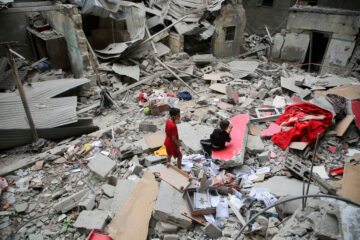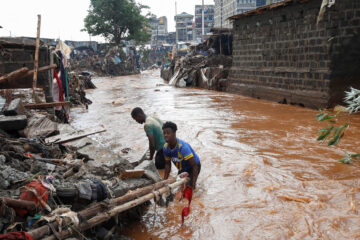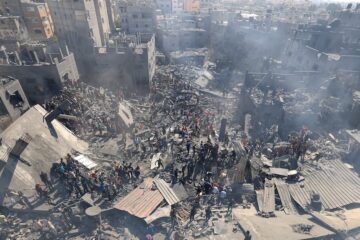Maliki refuses to go as Iraqis turn to new leader
Reuters
An increasingly isolated Nuri al-Maliki again protested his removal as Iraqi prime minister on Wednesday, as his own political party and his former sponsor in Iran publicly endorsed a successor who many in Baghdad hope can halt advancing Sunni jihadists.
Although abandoned by former backers in the United States and Iraq\’s Shi\’ite political and religious establishment, Maliki pressed his legal claim on power. Premier-designate Haider al-Abadi, meanwhile, held consultations on forming a coalition government that can unite warring factions after eight years that drove Sunnis to revolt over what they say was Maliki\’s sectarian bias.
Shi\’ite-led government forces and their allies among the ethnic Kurdish militias of northern Iraq were in action on the front lines against the Sunni fighters of the Islamic State as European Union states began to follow the U.S. lead and provide arms directly to the Kurds and step up efforts to help tens of thousands of refugees fleeing the advancing hard-line Islamists.
Maliki has built up a network of commanders in the armed forces and Shi\’ite militias who are loyal to him, but there was no sign that he was ready to resort to force against Abadi, a long-time associate in the Islamic Dawa Party.
In his continuing capacity as acting prime minister, Maliki said in a speech on state television that he was waiting for Iraq\’s Supreme Court to rule on his complaint that, as leader of the biggest bloc in the parliament elected in April, it was he, not Abadi, whom the president should invite to form a government. A court ruling against Maliki could be a way out of the stand-off.
"The violation that occurred has no value," Maliki said. "This government is continuing, and will not be changed except after the Federal Court issues its decision."
In a blow to Maliki, his Dawa Party called on Iraqi politicians to work with Abadi to form a new government.
The United States, during whose occupation Maliki first rose to power, made clear again that it has had enough of him. The White House said it would be glad to see an Abadi government and urged Maliki to let the political process move forward.
And Iranian Supreme Leader Ayatollah Ali Khamenei, bound to Tehran\’s U.S. adversary by a common interest in curbing the rise of Sunni jihadists in Syria and Iraq, offered his personal endorsement to Abadi. He very publicly distanced himself in the process from Maliki, who has looked for support from Iran, where he spent years in exile opposing Sunni dictator Saddam Hussein.
"I hope the designation of the new prime minister in Iraq will untie the knot and lead to the establishment of a new government and teach a good lesson to those who aim for sedition in Iraq," Khamenei said in a statement on his website.
Iranian media carried reports that Khamenei sent an envoy last month to take part in discussions with Shi\’ite political and religious leaders to find an alternative to Maliki.
Those leaders, including reclusive top cleric Grand Ayatollah Ali al-Sistani, last week rallied around Abadi, who once ran a British engineering company, as a compromise figure who could bring moderate Sunnis into power.
In online statements, Abadi said on Wednesday he had called on the various political blocs to appoint representatives to take part in talks on forming a cabinet. He hoped for a "strong government" that could help the country resolve the "crises and problems it faces on the political and security levels."
The U.N. Security Council urged Abadi "to work swiftly" to form an inclusive government and called on all political parties and their supporters "to remain calm and respect the political process."
There was more bloodshed in Baghdad, where at least 12 people were killed by bombs in two mainly Shi\’ite areas.
Violence also was reported along the 1,000-km (600-mile) front established by the Islamic State, which exploited the political stalemate in Baghdad to burst beyond strongholds in Syria to claim a cross-border caliphate occupying up to a third of Iraq.
Kurdish Peshmerga militia sources said their forces clashed with IS fighters in Diyala, northeast of Baghdad. In the provincial capital, Baquba, five Sunni Muslims were killed when Shi’ite gunmen shot them as they prayed in a mosque.
Government forces, which collapsed in the face of the Islamic State in June, fought alongside Shi\’ite volunteers around the Sunni city of Tikrit, north of the capital, and residents also reported skirmishes in the western cities of Ramadi and Falluja.
With ethnic Kurdish Peshmerga forces pushed back on the defensive by the Islamic State this month, France announced it was joining the United States in urgently supplying what it called "sophisticated arms" to the autonomous regional force, and EU foreign ministers agreed to break summer holidays to discuss the crisis on Friday.
A U.S. official said talks were also under way with Arab countries to supply munitions to the Kurds.
Germany said it would send non-lethal military equipment to Kurdish fighters this weekend, and Foreign Minister Frank-Walter Steinmeier said Berlin was prepared to bend its restrictive policies on weapons exports and send arms to the Kurds.
In addition to arming the Peshmerga and, in the case of Washington, bombing militant positions, Western powers have been trying to help aid agencies drop supplies and provide refuge for tens of thousands of people, many of them from non-Sunni communities, who have fled attacks by the Islamic State.
The White House said the United States and its allies were considering setting up airlifts and safe land corridors to rescue people, including many from the Yazidi sect stranded on the arid heights of Mount Sinjar near the Syrian border.
But a U.S. assessment team sent to Mount Sinjar on Wednesday found the situation better than expected, and the Pentagon said an evacuation mission was "far less likely."
The U.S. team found fewer civilians than expected and their condition was better than previously believed, the Pentagon said, crediting humanitarian air drops, U.S. air strikes on Islamic State targets and the ability of Yazidis to evacuate the mountain in recent nights.
The U.S. military, which has been hitting Islamic State targets since Friday in support of the trapped Yazidis, said a drone strike destroyed an armed truck near the village of Sinjar on Wednesday.
The White House said that while President Barack Obama has ruled out sending back combat troops to Iraq it could not rule out ground troops being used in a humanitarian role, a sign that Western powers could be drawn back into the region despite public reluctance to repeat the experience of the last decade.
Source: Reuters
[do_widget_area inner_adsbar]










